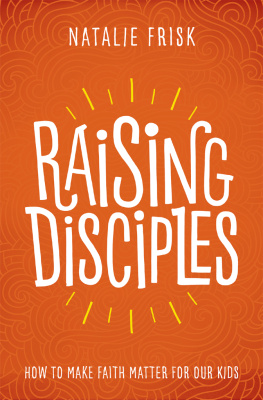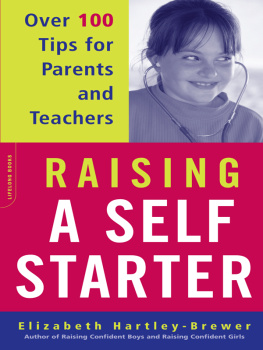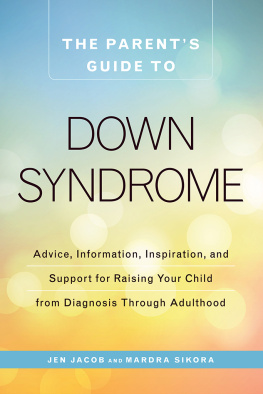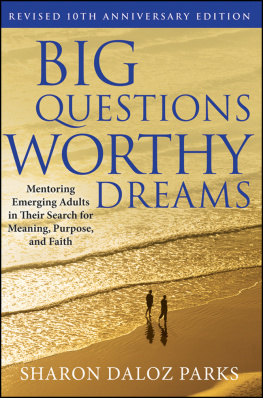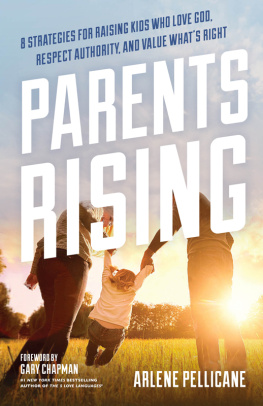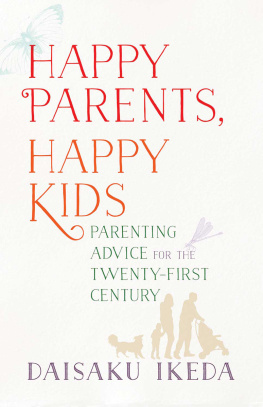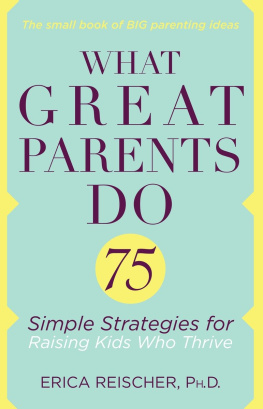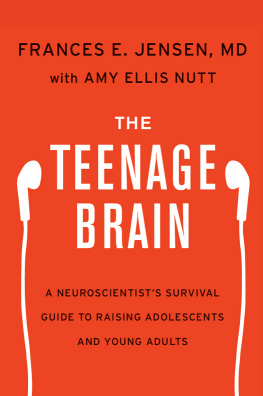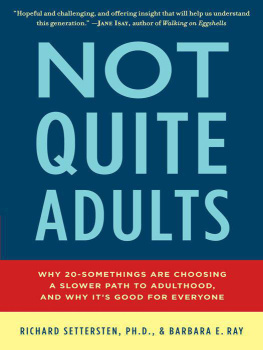Getting to 30
A Parents Guide to the 20-Something Years
Jeffrey Jensen Arnett, Ph.D. and Elizabeth Fishel
Workman Publishing New York
Copyright 2013, 2014 by Jeffrey Jensen Arnett and Elizabeth Fishel
All rights reserved. No portion of this book may be reproducedmechanically, electronically, or by any other means, including photocopyingwithout written permission of the publisher.
Published simultaneously in Canada by Thomas Allen & Son Limited.
Library of Congress Cataloging-in-Publication Data is available.
ISBN 978-0-7611-7698-5
Published previously as When Will My Grown-Up Kid Grow Up?
Cover design by Vaughn Andrews
Front cover photo by ghoststone/fotolia
Workman books are available at special discounts when purchased in bulk for premiums and sales promotions as well as for fund-raising or educational use. Special editions or book excerpts also can be created to specification. For details, contact the Special Sales Director at the address below, or send an email to .
Workman Publishing Co., Inc.
225 Varick Street
New York, NY 10014-4381
workman.com
WORKMAN is a registered trademark of Workman Publishing Co., Inc.
To Jeffs children, Paris and Miles, and to Elizabeths emerging adults, Nate and Will
CONTENTS
PREFACE
Emerging News About Emerging Adults
During the year since we first published this book in hardcover, emerging adults have been getting a lot of bad press. Grown-up kids between 18 and 29 have been bad-mouthed as lazy, selfish, narcissistic no-accounts. From the HBO series Girls to the Time magazine cover story trashing the Me Me Me Generation, the media have had a field day vilifying millennials as do-nothing slackers who sponge off their parents and never want to grow up.
This book tells a different story.
Combining Jeffs twenty years of research on young people and our shared three years of wide-ranging interviews with their parents, it firmly debunks these negative stereotypes. The portrait that we create here is a more nuanced and positive picture of the life stage between adolescence and adulthood that Jeff first named emerging adulthood in 2004.
Todays 20-somethings are searching for their identity, which is often unstable and in flux. Although their uncertainty does not mean they are lazy or selfish, for parents watching from the sidelines, their kids (and their life choices) can be perplexing, frustrating, and disappointing. Why, they want to know, is it taking my children longer than it took us to become adults? We wrote this book, in part, to explain the younger generation to the older one and to help parents find the necessary patience while their grown-up kids move forward on the path to adulthood. Indeed, our original hardcover title was When Will My Grown-Up Kid Grow Up?
Despite their instability, most of todays 18- to 29-year-olds are also determined and hardworking (many at the lowest, worst-paid jobs on the totem pole), resilient through their many false starts, and optimistic. They are also more tolerant, environmentally conscious, globally connected, and community-service oriented than their elders. We also wrote this book to celebrate and encourage the strong bond they still want to have with their parents and to guide parents in the essential art of staying connected while stepping back.
And now, because of the Clark University Poll of Parents of Emerging Adults, which Jeff directed in 2013, we are able to offer up even more encouraging evidence for our positive perspective.
First, some background: The Clark poll consisted of interviews with about 1,000 parents of emerging adults sampled from all regions of the United States, done by phone and online. The total sample was generally representative of the American population of parents of 18- to 29-year-olds: mean age 52, equally divided between men and women, and diverse in social class and ethnicity (69 percent were white, 13 percent Latina/Latino, 11 percent African American, 5 percent Asian American, and 2 percent were of other ethnic origins).
But regardless of their circumstances, the poll showed, as our research had shown before, that American parents are more similar than different in loving their children, wanting the best for them, and being willing to support them through the inevitable bumpy ride of their twenties.
Because the Clark findings add weight to our original observations, we want to highlight several of them here:
Todays grown-up kids want to stay close to their parentsand both sides benefit. More than half of parents polled say they are in contact with their grown kids every day or almost every day. Most offer their kids emotional support, at least occasionally, especially in the years before their kids have found life partners of their own. But when it comes to how much contact they want, some things never change: If parents are less than satisfied about the amount of communication, they want more, not less.
Harmony (usually) reigns. Parents and their emerging adults usually get along well, much better than they did during the stormy teenage years. In fact, parents enjoy their relationships with their grown kids more than anything else in their livesmore than hobbies or leisure activities, watching television, travel or holidays, and even their relationship with their spouse or partner.
When kids boomerang home, they bring more pleasure than pain. True, in these days of economic strains, a relatively high proportion of emerging adults (38 percent) return to the nest at one point or another. But the Clark findings discredit the popular view that parents groan when their 20-something kids move back home and immediately begin scheming to get them out again. Of the parents who have an emerging adult child living with them, 61 percent describe their feelings about it as mostly positive and only 6 percent describe the experience as mostly negative. Although parents lives become disrupted in various ways, the upheavals are usually short term, and the benefits of increased closeness and companionship outweigh the wet towels on the floor.
Money is a hot-button issue. Worrying about their grown kids money woes ranks number one for parents, higher than fretting over their kids choosing the wrong romantic partner or their lack of work or educational progress. Over half of all parents need to keep the Bank of Mom and Dad open for their 18- to 29-year-olds, and perhaps not surprisingly, half of all parents also express concern that their emerging adult is taking too long to become financially independent. But what goes around comes around: More than three-fourths of parentseven higher among African Americansare confident that their child will be willing to help care for them in their old age if they need help.
Both parents and grown-up kids are optimistic about their new life stage. One of our most important research findings is the parallel track between parents and their emerging adults. As grown-up kids are emerging into the possibilities of their adult lives, parents are emerging into their own new life stagethe one that follows years of full-on parenting. The stress of change and uncertainty may make life for both generations emotionally complicated, but the Clark poll underlines the sense of optimism on both sides. Both groups generally see themselves as being at a good time of life, characterized by freedom, fun, and excitement, a time to focus on themselves and find out who they really are.
Weve talked to parents of emerging adults all over the country this past year, and weve been gratified that this book has struck a nerve. It reassured the mom whose son keeps switching jobs and hasnt found his niche, the stepparents trying to combine two families with unhappy 20-somethings, the dad who worries that his passionate but underemployed daughter will never be self-supporting, and the parents whose kid is grappling with depression, as well as the helping professionals who are working with all these families.
Next page

